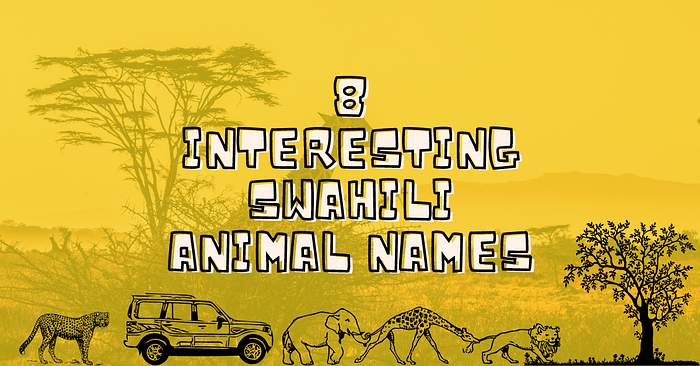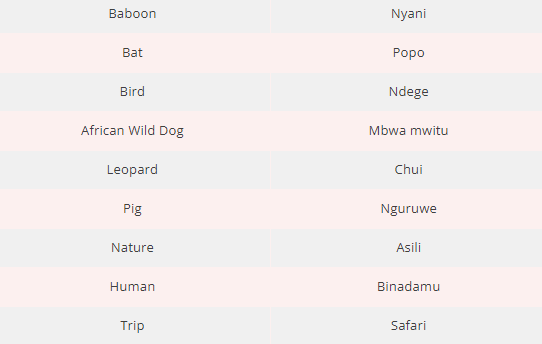8 Interesting Swahili Animal Names
Original Post: https://ling-app.com/tips/swahili-animal-names/

Did you know that many of the character names in Lion King are based on Swahili animal names? In this post, we will learn some Swahili animal names to add to your Swahili vocab since this language is perhaps one of the most interesting ones to learn especially if you are planning to take a trip to the safari! What better way to connect with the animal handlers and the locals but in a language that is very close to their hearts, right?
Swahili is the lingua franca of the African Great Lakes region and other parts of East and Southern Africa. Out of the many African languages, Swahili is the most spoken language in Africa, so it would be beneficial for you to take note of the animal names in Swahili since East Africa is the best place to get a sighting of these beautiful animals. You might even score brownie points with your safari guide if you use the animal names in Swahili instead of English.
Swahili Words For Animals
To start, the word ‘safari’ actually means ‘a a trip’ in Swahili. Let me introduce you to some other basic words firsts.
- The Swahili word for ‘animal’ is ‘mnyama’ (pronounce: nee-yuh-muh)or ‘wanyama’ (pronounce: won-yuh-muh)for plural.
- ‘wild animals’ in Swahili is called ‘wanyama pori’.
African Animal Names In Swahili

Now let us move on to the names of the most common animals in the African countries.
Lion — Simba
A piece of not-so-surprise information is it? Maybe an awkward name for a cub lion but a Simba from the Lion King grew into his name as he become the King of the Pride Lands.
Lions are the only cat species to live in groups or pride. It is a common sight in any National Geographic to film a pride of lions hunting for food, they never hunt on their own, a rare trait for other cat species.
They are also at the top of the food chain in African lands, so it is no surprise that they are the largest of all African carnivores.
Elephant — Tembo / Ndovu
The Swahili name for ‘elephant’ is ‘tembo’ (pronounce: tame-boah) or ‘ndovu’ (pronounce: n-doh-voo).
The African Elephants are the largest mammal on the planet; which also means they are bigger and heavier compared to their Asian counterparts.
The African Elephants can weigh up to 15 400 lbs (almost 7000 KG). They also have two ‘fingers on the tip of their trunks that allows them to have the flexibility to hold small objects.
Giraffes — Twiga
Of all the animal names in Swahili, this one tickles me a little bit. The Swahili name for ‘giraffe’ is ‘twiga’ (pronounce: twee-guh). Because it sounds like the word ‘twig’, a fitting name for this tall and twig-like animal.
Do you know that their necks have the same amount of vertebrae as humans do? Except, each of their bones are so long they can add up to 2.4 meters high. The cute little horn-like ‘knobs’ are used to protect their head from injuries or attacks of the same kind.
Crocodile — Mamba
‘Mamba’ is actually ‘crocodile’ in Swahili, not a snake, to my surprise.
The adult Nile crocodile is the world’s second-largest crocodile, measuring roughly 4.2 meters long and weighing up to 410 kg. While it is not as large as the saltwater crocodile, is a formidable predator and one of nature’s most feared “murderers.”
Gustave was the name given to the Nile crocodile that holds 5th place on the World’s Largest Crocodiles list. This crocodile from Burundi was 17 feet long and was a notorious man-eater. Rumore has it that it was responsible for more than 300 human deaths.
Zebra — Punda Milia
‘Zebra’ in Swahili is called ‘punda milia’ and nobody knows if they are white with black stripes or black with white stripes.
Zebras are family with the horses, just stripier. The only 3 subspecies of zebras, all belong to the continent of Africa and you can tell them apart from how widely their stripes spread out. (an avid reason why you should have binoculars for your safari trip).
Cheetah — Duma
The Swahili word for ‘cheetah’ is ‘duma’ (pronounce: doo-muh).
Do you know that cheetahs are not part of the Big Cat family? Have you ever wonder why? Despite being amazing hunters, cheetahs cannot roar- which is the main requirement to be categorized as a big cat. As for now, only 4 Big Cats are roaming on earth- the tiger, lion, leopard, and Jaguar.
Hippopotamus — Kiboko
The hippopotamus is called ‘kiboko’ in Swahili.
This interesting creature is indigenous to 29 African countries and spends most of its day in reverse of the swamp. But don’t be fooled by their lazy appearance, they are considered one of the most dangerous and murderous animals ever, especially you see one swimming behind you.
Vulture — Tai
Vultures in Swahili are named ‘tai’ (pronounce: tie).
Sadly, out of all the 11 species of vultures found in Africa, 7 of them are facing extinction. People always stereotyped vultures as creatures bringing doom and relating to death and decay, not to mention how they are not the prettiest of them all. What people do not know is that clean up the lands like scavengers, for free! That’s a pretty good deal to keep the African lands clean if you ask me.
Lion King Names In Swahili

As I have mentioned before, many names from the famous movie the Lion King have Swahili names, they even use Swahili and other African languages in the soundtrack. Some of them are as below:
- Simba, as I mentioned before means lion.
- Rafiki, a mandril who helps Simba along his journey, actually means ‘a friend’.
- Pumba is the name of a warthog, Simba’s friend. His name is derived from the word ‘upumbavu’, which means stupidity- a fitting name for Pumba who is always careless and absentminded.
- Shenzi is one of the hyena characters that were always planning something bad alongside the villain, Scar. ‘Shenzi’ is the word for ‘savage’ in Swahili.
Other Animal Names In Swahili


What To Do Next?

So what is next after you manage to memorize all these animal names in Swahili? You can improve your knowledge of Swahili by download Ling App for free. Why Ling App? It’s because it offers many features that can help you learn Swahili and 60 other languages, like audio files, quizzes, exercises, and many more. A sweet deal to get you to master a language at your own pace.
